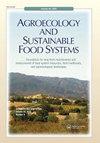Agroecological transitions during COVID-19: evidence from Kerala, India
IF 2.6
3区 农林科学
Q1 AGRICULTURE, MULTIDISCIPLINARY
引用次数: 0
Abstract
ABSTRACTTo emerge as a dominant socio-technological regime, agroecological transitions require supportive public policies and collective agroecological actions, with refinement in scientific/technological practices, cultures, markets, and user preferences. Using a multi-level perspective approach, this study inquires why the proper positioning of these determinants is substantial in transforming niche innovations in agroecology into a dominant regime by replacing vicious cycles associated with enriching agribusiness with virtuous cycles that support regional ecologies and communities. The models of agroecological transition during the pre-COVID-19 and COVID-19 periods in Kerala and how the political agroecological position during the latter period succeeded in enabling a transition were examined. Owing to the landscape turbulence caused by COVID-19, the Government of Kerala triggered the de/realignment of determinants toward agroecological transition through programs, strategies, and nudges using a bottom-up approach under the “Subhiksha Keralam” (Self Sufficient Kerala) project. At the agroecosystem level, Characteristics of Agroecological Transition was used to quantify the magnitude of transition, the results demonstrating an improvement in farms during the COVID-19 period. The majority of homestead farms were characterized as agroecological, either in transition or advanced. Agroecological transition became possible because the government systematically targeted user preferences and societal values, along with modifying policy and technology, through nudges, thereby preventing possible lock-ins.KEYWORDS: Agroecological transitionmulti-level perspectivecharacterization of agroecological transitionniche innovationsocio-technological regimeCOVID-19Kerala Disclosure statementNo potential conflict of interest was reported by the author(s).Data availability statementThe data supporting the findings of this study are available from the corresponding author upon reasonable request.Additional informationFundingThe work was supported by the University of Kerala [Grant No: 3147/2021/UoK dated 30/06/2021].2019冠状病毒病期间的农业生态转型:来自印度喀拉拉邦的证据
摘要为了成为主导的社会技术体制,农业生态转型需要支持性的公共政策和集体农业生态行动,并在科学/技术实践、文化、市场和用户偏好方面进行改进。利用多层次视角,本研究探讨了为什么这些决定因素的正确定位对于将生态农业中的生态位创新转变为主导机制至关重要,因为生态农业创新可以通过支持区域生态和社区的良性循环取代与丰富农业综合企业相关的恶性循环。研究了喀拉拉邦在2019冠状病毒病前和2019冠状病毒病期间的农业生态转型模式,以及后一时期的农业生态政治立场如何成功地实现了转型。由于2019冠状病毒病造成的景观动荡,喀拉拉邦政府在“喀拉拉邦自给自足”项目下采用自下而上的方法,通过规划、战略和推动,触发了农业生态转型决定因素的调整。在农业生态系统层面,利用农业生态转型特征(Characteristics of agricultural - ecological Transition)对转型程度进行量化,结果表明,在2019冠状病毒病疫情期间,农场状况有所改善。大多数宅基地农场具有农业生态特征,或处于过渡阶段,或处于先进阶段。农业生态转型之所以成为可能,是因为政府系统地针对用户偏好和社会价值观,同时通过推动修改政策和技术,从而防止可能的锁定。关键词:农业生态转型;多层次视角;农业生态转型特征;生态位创新;社会技术制度;数据可得性声明支持本研究结果的数据可根据通讯作者的合理要求提供。这项工作得到了喀拉拉邦大学的支持[批准号:3147/2021/UoK,日期:30/06/2021]。
本文章由计算机程序翻译,如有差异,请以英文原文为准。
求助全文
约1分钟内获得全文
求助全文
来源期刊

Agroecology and Sustainable Food Systems
AGRICULTURE, MULTIDISCIPLINARY-GREEN & SUSTAINABLE SCIENCE & TECHNOLOGY
CiteScore
4.80
自引率
7.70%
发文量
73
期刊介绍:
Agroecology and Sustainable Food Systems is devoted to the rapidly emerging fields of agroecology and food system sustainability. By linking scientific inquiry and productive practice with transformative social action, agroecology provides a foundation for developing the alternative food systems of the future. The journal focuses on the changes that need to occur in the design and management of our food systems in order to balance natural resource use and environmental protection with the needs of production, economic viability, food security, and the social well-being of all people.
Agroecology and Sustainable Food Systems examines our current food systems from production to consumption, and the urgent need to transition to long-term sustainability. The journal promotes the study and application of agroecology for developing alternatives to the complex problems of resource depletion, environmental degradation, a narrowing of agrobiodiversity, continued world hunger, consolidation and industrialization of the food system, climate change, and the loss of farm land. The journal uses a food systems approach, and seeks experiences in agroecology that are on-farm, participatory, change-oriented, and backed by broad-based methodologies of sustainability analysis and evaluation.
 求助内容:
求助内容: 应助结果提醒方式:
应助结果提醒方式:


